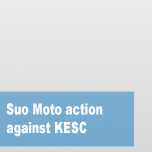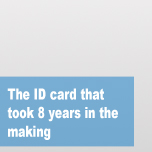Success Stories
Welcome
Welcome to our Success Stories section.
Here you will find true stories about victims of corruption, their struggle and their eventual triumph. The names have been changed to protect the identity of the people involved. We hope these stories help to inspire you to stand up to corruption.
Corruption in the Pensions Office
Dr. Hussain Kadeer* had worked for the government of Pakistan as a senior pathologist for 32 years. On 31st July 2012, he retired from his post and looked forward to spending his retirement in peace. Little did he know, however, that such a simple process would turn into a complete nuisance for him and his family. On 15th December 2013, TI Pakistan received a complaint from Dr. Kadeer on ALAC’s dedicated site for complaints. He explained about the difficulties he faced when his pension process started. In order to start this process, one is meant to supply a record of their employment – the full record of his service of 32 years – to different departments.
As far as his organization was concerned, things were fairly easy as he knew the concerned people and they attested his documents for him. However, when the time came to submit documents in the Accountant General of the Sindh Pension’s office, he faced many difficulties and hardships. Dr. Kadeer stated that the full record of his employment and salary throughout his service had been submitted to that office. However, when the pensioner visited the office to follow up on the status of his documents, the concerned officer, Adeel Rizvi* denied ever having received his records. Without his records, Dr. Kadeer would not be able to receive his pension and gratuity. However, Adeel did go on to say that for Rs0.2 million, he would be willing to overlook the non-availability of Hussain’s records and “solve all his problems”. Dr. Kadeer had been used to hearing about this behaviour from this office and had heard about pensioners being faced with such corruption on a daily basis. He knew of cases where people had not received their pensions in their lifetime and had passed away without ever seeing a penny of it; there was even a case – Dr. Kadeer stated – where the widow of a pensioner had not received any funds even after a decade after her husband’s death as he did not pay the solicited bribe. While going through this ordeal, Hussain came across Transparency International Pakistan through their advertisements and decided to email us the issue.
After the complainant got in touch with us, we decided to write a letter detailing his grievances to the Accountant General of Sindh Pensions. The copies of this letter were also forwarded to the Chief Secretary of the Government of Sindh, the Chairman of the National Accountability Bureau (NAB) – the premier anti-corruption agency in the country, the Registrar of the Sindh High Court, and the Chairman of the Public Accounts Committee in the Sindh Assembly. In around three weeks, we got a response from the NAB. They wanted to take action on the complaint and got in touch with us for further information about the complainant. After that, everything was a blur.
After few days, we received the following email from the client where he thanked TI Pakistan for solving his case and appreciated our efforts. He wrote: "Due to your efforts and the letter from the Chief Secretary, Government of Sindh to the Accountant General, my matter was solved. The AG office has informed me that the matter is now finalised and I may collect my pension papers, which I did.” He then told us that the concerned persons excused for the delay and handed over the final letter to him which enabled him to get his pension. Thus, this case deemed to be a successful one.
In the end, what matters is that people like Dr. Hussain Kadeer – those that refuse to indulge in bribery and stand up for their rights – get the desired, happy ending that they worked so hard for. This, in itself, is the biggest success we could ever ask for. *Actual names have been changed
The villager that just said ‘no’

Shabbir Ahmed* grew up in Punjab in unfortunate circumstances. He lived most of his life not being able to make ends meet. A scheme started by Shahbaz Sharif, Chief Minister of Punjab, enabled people like Shabbir to get on their feet by giving them financial help of Rs20,000. This scheme was a god-send to him. On 17th January 2013, Shabbir was to collect his funds from a relief camp set up at Degree College in the district of Dera Ghazi Khan. However, when he went to the person in charge for the distribution of tokens that would make his eligible for the funds, the Revenue Officer of the area or patwari, Jamal*, things were not as clean-cut as our client had
hoped. Jamal asked Shabbir to give him Rs2,000 before he would do anything for him. Shabbir refused and left the line. He later noticed that the patwari was soliciting bribes from each and every person standing in queue. Shabbir had heard of an organization that took care of corruption-related complaints and thought to call Transparency International Pakistan’s hotline right away. When he called the ALAC helpline, he was forwarded to one of the staff members who advised him not to give any bribes to the patwari. The staff member then took the patwari’s contact number from Shabbir. After introducing himself, the staff member – Ashfaque – interrogated Jamal on the phone. Ashfaque asked if he was involved in corruption – an illegal activity which is a crime. The patwari denied and the phone call was ended shortly. After a few days, on 21st January, the complainant informed Ashfaque that he was on his way to receive his token. Ashfaque told him to stand his ground and not let Jamal bully him into giving money as it was his right to get his token without giving a bribe. Shabbir was also told that the ALAC office had spoken to Jamal and if there was any further mischief, to report it back immediately. On the same day, a delighted Shabbir contacted the ALAC office again and informed with immense satisfaction that he had received his token without giving a single rupee in exchange. He said that when he went Jamal again asked for a bribe but Shabbir did not budge and asked for a receipt of the Rs2,000 if it were a government fee – as that was the only way he was going to part with the money. According to the client, Jamal the patwari at once become nervous and said that he was “just joking” and gave him the coupon. Shabbir was ecstatic at this outcome and thanked ALAC for its effort and support. Ashfaque told the happy villager that this was their job and that now it was his job to inform others around him about this incident and motivate them not to give bribes. In this way, not only would they save their money, but their conscience too.
*Actual names have been changed.
Bribery in Birth Certificate office
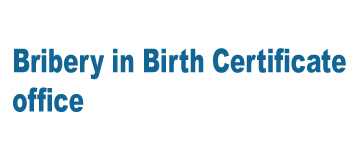
Asad* and Sharmeela* lived in Qatalpur and welcomed a beautiful baby daughter in the beginning of 2013. With all the responsibilities and formalities that arise with having a child, one of the top priorities is attaining a birth certificate. When Asad went to the requisite office, the Secretary Union Council, Qatalpur named Zaid demanded a bribe of Rs700 for making the certificate. Not knowing what to do in this situation, Asad called the ALAC office. After the initial information was recorded, the call was transferred to the ALAC lawyer. Safdar, the lawyer, advised Asad to not give any form of extra money or
bribe to Zaid, but take a few people for support to the office. If Zaid still insisted on asking for a bribe, Safdar advised, go to the senior officials or any other officer present there. On 2nd February, Safdar followed up on the case and he was informed by Asad that he was able to obtain the birth certificate for his child without resolving to bribe Zaid. He thanked TI Pakistan profusely and was grateful that the matter had been settled so swiftly.
*Actual names have been changed
Suo Moto action against KESC
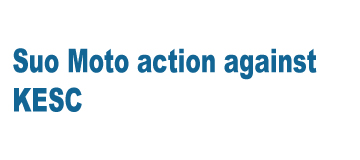
One of our major successes in this quarter came from a case where the estimated misuse of exchequer money annually was said to be approximately Rs66 billion. On 17th September 2012, TI Pakistan pleaded to the Supreme Court to take a Suo Moto action on the allegation of this misuse of funds by the Ministry of Finance to facilitate the Karachi Electric Supply Corporation (KESC), a privatized company, under an illegal amendment to the Agreement of 2005 between the Pakistan government and the KESC in 2009. TI Pakistan requested the Prime Minister to take notice of the complaint and terminate the unconstitutional concession granted in 2009,
because of which the National Electric Power Regulatory Authority (NEPRA has been able to grant illegal tariff increases to KESC to the amount of Rs198 billion. On 4th December 2012, the Supreme Court took a Suo Moto action and directed the Ministry of Finance, the Establishment Division and NEPRA to submit a report on the issue forwarded by TI Pakistan before 24th December 2012.
home Previous NextThe ID card that took 8 years in the
making
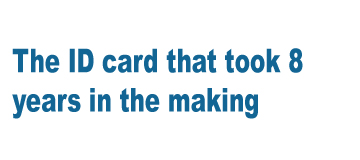
In April, we received a call from Nargis*, an overseas citizen living in London. Her complaint revolved around the inefficacy of the National Database and Registered Authority (Nadra). She had been unable to obtain a NICOP card for her mother. A NICOP (National Identity Card for Overseas Pakistanis) is a registration document to be issued to a valid/legitimate citizen of Pakistan. Previously it was issued to overseas Pakistanis working/living/staying/studying abroad for consecutive time period of six months or possessing dual nationalities but now it can be issued to any citizen of Pakistan.
On 24th April, 2012 we received a call from Nargis* concerned about her mother’s NICOP identification card. The complainant resides in London and is an overseas Pakistani. Nargis had been trying to get a NICOP for her mother, Zubia*, since December 2003 but had not received it. This in turn caused a lot of problems to Zubia as she was unable to travel to Pakistan without this card. On the advice of the staff at the Consulate of Pakistan Bradford Office, Nargis’ mother made a fresh application in December 2011 in order to apply for a new computerized NICOP. Even then the card did not materialize as there were problems. That is when the complainant contacted TI Pakistan. When the complaint came to ALAC, we first spoke to the complainant in detail to ascertain the problems that she faced. We then contacted Nadra and spoke to one of their spokespeople in order to get their side of the story. According to Nadra, there were a few system glitches which showed that Zubia’s card had already been dispatched but it was in another person’s name. In June 2012, the ALAC wrote to the Nadra authorities to rectify this issue. After sending reminders on 2nd July and 19th September, there was still no response from Nadra. Many calls were also made to the authority to fix the issue, but to no avail. Finally, in January 2013, a positive response was received from Nadra in the shape of a letter confirming that the concerned NICOP had been dispatched to the complainant. Thus, after 8 years, the complaint finally received her NICOP after TI Pakistan’s intervention. We consider this a success.
*Actual name has been changed
home Previous Next




